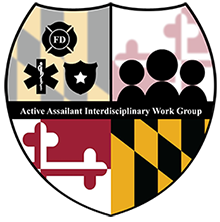Prevention and Early Intervention Resources
Maryland offers multiple tip reporting and resource helplines to allow people to report suspicious or concerning behaviors, report concerns with school and student safety, and obtain mental and behavioral health resources and other wraparound services. Selected resources of interest in preparedness, prevention, guidance & best practices, victim assistance, and behavioral threat assessment are included below. Additional resources on this topic related specifically to the educational environment or the workforce may be found in the sector-specific links under the “Resources” tab.
If a situation is life-threatening, get immediate emergency assistance by calling 9-1-1. If you are deaf, have difficulty hearing, or have a speech-related disability or other medical condition, or if the situation is unsafe to place a voice call, you can text to 9-1-1 for assistance.
Preparedness
https://www.mcac.maryland.gov/
Created in the aftermath of the September 11, 2001, terrorist attack on the United States, the Maryland Coordination and Analysis Center (MCAC) coordinates the efforts of federal, state, and local agencies to gather, analyze, and share intelligence information with law enforcement, public health, and emergency responder personnel. The MCAC provides resources 24/7/365. Individuals may report suspicious activity or concerns by calling 1-800-492-TIPS (8477), or via email to MDWatch@mcac.maryland.gov.
https://schoolsafety.maryland.gov/Pages/Tipline.aspx
Safe Schools Maryland by the Maryland Center for School Safety is an the state’s only officially ANONYMOUS and FREE reporting system available to students, teachers, school staff members, parents, and the general public to report any school or student safety concerns, including mental health concerns. Safe Schools Maryland operates twenty-four hours a day, seven days a week, and 365 days a year.
CPTED (Crime Prevention Through Environmental Design) refers to structural and design methods combined with the natural environment to reduce criminal activity and vulnerability. This website for the International CPTED Association provides an overview of that entity’s work, along with a primer on first and second-generation CPTED concepts that may be used in evaluating planning and preparedness strategies and overall risk management for various facilities.
This overview, provided by the Society for Human Resource Management, covers a range of prevention and response resources related to active assailants, domestic violence, suicidal ideation, bombs or arson threats, and handling of suspicious packages or other mail in the workplace.
https://www.fbi.gov/how-we-can-help-you/safety-resources/active-shooter-safety-resources
The Federal Bureau of Investigation provides an overview of active shooter safety resources and training.
Guidance & Best Practices
This bulletin provides the outline for a basic behavioral threat assessment for mass violence incidents. It contains references for customizable fields for jurisdictions to adapt to fit local needs.
This is a customizable template for first responders to use with individuals who may need coordinated care and wrap-around services following a call for emergency service.
This customizable template is broader than the release of medical information template. It is designed to facilitate services between multiple social services entities who may be involved in providing coordinated care and wraparound services to individuals in crisis.
https://www.fbi.gov/file-repository/active-shooter-incidents-in-the-us-2021-052422.pdf/view
The FBI designated 61 shootings in 2021 as active shooter incidents and created a report to review the incidents.
https://www.fbi.gov/file-repository/active-shooter-incidents-in-the-us-2020-070121.pdf/view
The FBI designated 40 shootings in 2020 as active shooter incidents and created a report to review the incidents.
This report, produced by the FBI’s Office of Partner Engagement, encompasses statistical data regarding 333 active shooter incidents in the United States between 2000 and 2019. Each page focuses on a particular active shooter-related topic and has been designed specifically for law enforcement officers, other first responders, corporations, educators, and the general public.
https://www.fbi.gov/file-repository/active-shooter-incidents-2000-2018.pdf/view
This document contains a list of active shooter incidents in the United States that have been identified by the FBI from 2000 through the end of 2018.
This article provides lessons learned from the FBI’s Behavioral Threat Assessment Center regarding acts of targeted violence.
Victim Assistance
Maryland 2-1-1 offers assistance with mental and behavioral health crises, and referrals to other wraparound services such as food, housing and shelter, medication management, employment, career counseling, financial assistance, utility assistance, and healthcare. Domestic and family violence resources are also available. Families and individuals in need of assistance may call 2-1-1, or use the website to engage in an online chat, or via text message to TXT-211. The service is available 24/7, and all communications are confidential.
https://findtreatment.samhsa.gov/
The U.S. Department of Health and Human Services provides confidential and anonymous resources for locating behavioral and mental health counseling and treatment services throughout the United States.

